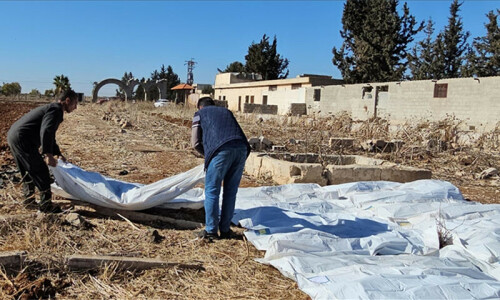EVEN a cursory review of discussions in Pakistan on the subject suggests that a desperate search for a shortcut to development has been going on for decades. How to attain fast-paced development seems to be the main concern of policymakers and institutions, and not what kind of development and development for whom.
Enthusiasts support the idea of ‘development first’ and ‘development at any cost’. Some suggest, directly or indirectly, that democracy and freedom can wait and a ‘transitional government’ — a sort of national government, a government run by technocrats, a strong autocratic government — should be established for a period of 10 to 20 years to deliver. The Chinese, Malaysian, Singaporean, South Korean, and, until recently, the Bangladeshi models of development have been cited to justify authoritarian governance and market the narrative of development without freedom.
In the case of Bangladesh, the events following the Dhaka University students’ protest against the quota system in government jobs, which led to the toppling of Bangladesh prime minister Sheikh Hasina Wajed’s government earlier this month, clearly show that development without freedom is no guarantee of political stability and sustainable development.
Since it emerged as a sovereign country in 1971, Bangladesh has passed through many storms and evolved like a number of other post-colonial societies. Pre-1971, the eastern wing struggled for equal rights and democracy. However, on attaining statehood, it drifted away from its cherished goals. By and large, its post-independence history remains overshadowed by authoritarian governance, mob violence, successful and unsuccessful military coups, the assassination of political leaders — including Bangladesh’s founder Mujibur Rahman along with most of his family members in August 1975 and Lt-Gen Ziaur Rahman, the sixth president of Bangladesh, in May 1981 — stifling of the media, rigged elections and rampant corruption. A country created in the name of democracy, freedom, and prosperity for all ended up as a typical Third World country.
Economic success is no guarantee of political stability.
However, the long and uninterrupted autocratic rule of Sheikh Hasina Wajed from 2009 to 2024 did transform the country into a roaring economic success. Small wonder, then, that the rise of the country as one of the fastest-growing economies in Asia was noticed worldwide.
What was less noticed, however, was its mediaeval style of politics. The new history of Bangladesh, written on the premises of the universities, colleges and schools of Dhaka and other cities and towns, and on the streets and paddy fields of the country, has revealed that spectacular development without freedom is akin to building a gigantic building structure on a very weak foundation.
In less than a few weeks, the pyramid of power and economy was brought down by a popular uprising. This uprising was not led by any towering opposition leader, nor by the front-ranking, military-supported Bangladesh Nationalist Party, nor by prominent social reformers and civil society leaders, including Nobel laureate Dr Muhammad Yunus, who now heads the post-Hasina Wajed government. Led by little-known student leaders, this historic movement rejected the idea of development without freedom.
Amartya Sen, leading Indian economist and Nobel laureate, published an important study in 1999. This study, which is titled Development as Freedom, exercised considerable influence on the international discourse on development and change. In this study, he puts forward the idea that development is freedom, because it increases the freedom of choice.
The idea of development at any cost, and the Chinese, Ma-laysian, Singaporean, South Korean and, later, the Bangladeshi model of development, seem to have impressed many development experts and policymakers in Pakistan. The viewpoint is quite widespread that rapid development should be attained even if freedoms and rights have to be sacrificed. Being fascinated by the authoritarian brand, many pay little attention to the consequences of the rapidly spreading fascistic tendencies in various societies around the world.
Worse still, it is little noticed and much less appreciated that countries such as Australia, Canada, Japan, New Zealand, Norway, Sweden, Switzerland, the UK and US, and several others, have been enjoying sustainable development because of the blending of democracy, freedom, rule of law and development in their political, economic and social system.
The writer, the former chairperson of the Department of International Relations, University of Karachi, is a leading peace scholar from Pakistan.
Published in Dawn, August 27th, 2024













































Dear visitor, the comments section is undergoing an overhaul and will return soon.